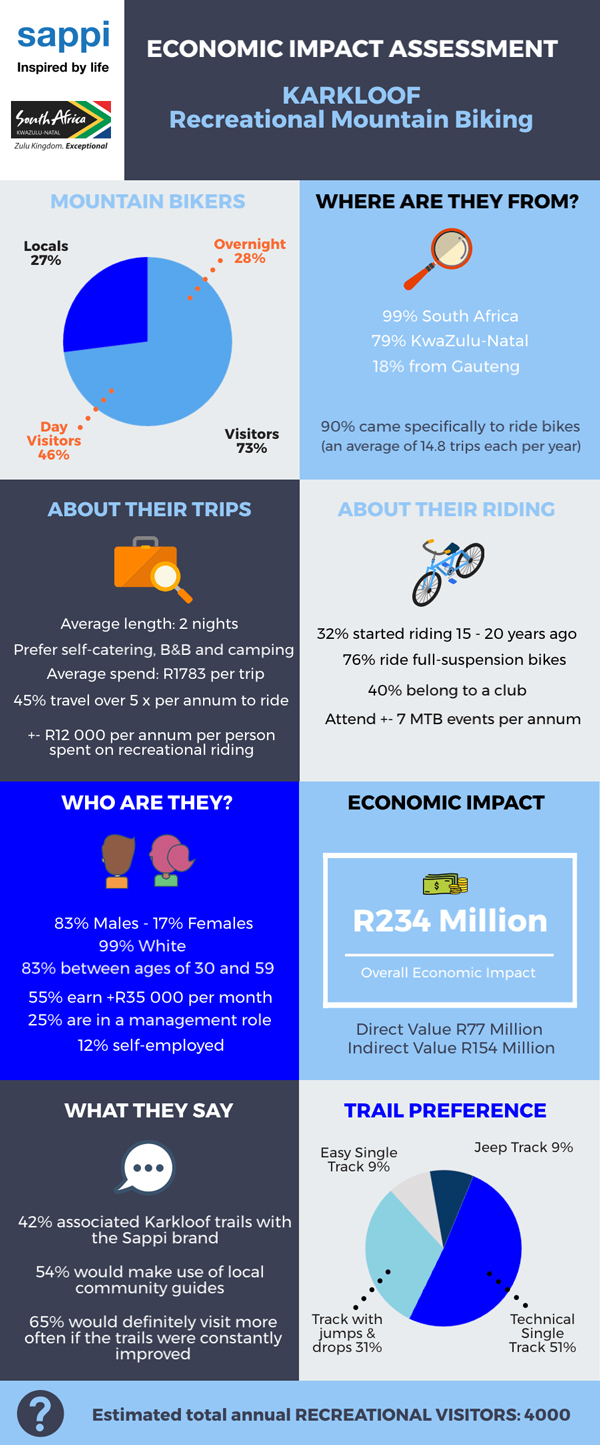With the 23rd edition of the Sappi Karkloof Classic Trail Festival looming large on the trail running and MTB calendar at the end of May, economists and tourism experts have placed the value of recreational outdoor tourism to the Karkloof local economy at R234 million.
Economic spend figures were first derived from research at the 2015 edition of the Sappi Karkloof Trail Festival, using data gleaned from 416 overnight visitors and 1183 day visitors to the event. Results showed that the direct spend into the local economy on the weekend was estimated at R6 017 012, with the broader economic value to the area being R12 million.
To further understand the economic impact of recreational access to Sappi land, studies were performed at the end of 2016 by Tourism KwaZulu-Natal. Researchers concluded that the sport tourism direct value was estimated at R77 million, with the indirect and broader economic value reaching R234 million.
In other words, mountain biking and the highly regarded trail networks in particular are impacting the area positively, through direct and indirect spending by mountain biking tourists.

Photo: Anthony Grote/Gameplan Media
When compared to similar research conducted in 2013, the study showed that more of the respondents were choosing to stay overnight in the area, even though 90% of the participants were from KwaZulu-Natal.
For Sappi, investing in a high profile event like the Sappi Karkloof Classic Trail Festival creates a direct economic injection into the region’s economy in addition to showcasing their plantations and their important environmental initiatives.
“Part of running a sustainable business is managing different types of capital, one of which is social and relationship capital,” said Sappi’s Communications Manager for Forests, Zelda Schwalbach.
‘By virtue of being one of South Africa’s largest landowners, we have many neighbours and stakeholders and it makes sense to engage with communities, including the mountain biking community. It’s helpful for us to have more eyes and ears on the ground in our forests, and we’re pleased that the public can spend time doing what they love on our land through the Sappi MTB Project.
“Investing in the Sappi Karkloof Classic Trail Festival is important, as the event allows a showcase of the trails and land, and the positive experience brings people back with their friends and family to the area, thus supporting the local economy” added Schwalbach.
Tourism KwaZulu-Natal commissioned the research into the value of the Karkloof day and overnight visitors, and found it to be a good example of the economic impact of sport tourism.
“Events play a critical role in growing the economy directly and indirectly. Events like this one have a huge economic impact as the employment opportunities are created for the local residents and local businesses benefit. An event of this nature can generate almost 12 million over one weekend,” said Ndabo Khoza, the Chief Executive Officer of Tourism KwaZulu-Natal.
“Events that are hosted on an annual basis have a greater potential to create continuous and sustainable economic growth for local economies as well as for the province.
“Sports tourism is a key component of events tourism as well as destination promotion. Sports Tourism assists with seasonality within the sector,” added Khoza.
“Sports enthusiasts are always willing to travel anytime and anywhere to see their favourite team or to follow a particular sport that they like regardless of the season. Sports travellers can take an opportunity between events to explore tourist attraction around the area.
“Furthermore, they are likely to take a token back home as reminder of a trip that they took, which then serves as a compelling marketing tool for the destination. If they have enjoyed themselves in that destination, they are more likely to come back as a leisure tourist,” Khoza pointed out.
He added that the growth of the event, at a time when others are dwindling, was due to a number of key factors.
“It is not surprising that the event has grown as much as it has because it is very well organized and takes place in a stunning part of the country. Also mountain biking and trail running are growing at a rapid pace in terms of being a sport and also a leisure activity.
“The Sappi Karkloof Classic Trail Festival is a prime example of an event that leaves a lasting legacy in the region in which it is held. Not only does the event have a positive socio-economic impact on the local economy, but it also has created a number of permanent and temporary employment opportunities.
“The fact that the trails can be used all year round shows that the event has definitely created a legacy as it has provided much needed revenue to a number of local residents. Indirectly, the trails also contribute to the local economy through recreational riders as many of these buy food in town or even stay overnight,” said Khoza.
“Events such as the Sappi Karkloof Classic Trail Festival thrive on corporate sponsorships and if these sponsorships and investments can continue to drive the growth of the event, it is extremely likely that the event will continue to have a very positive economic impact on the local economy,” concluded Khoza.
Statistics:
MTB riders visiting Karkloof
79% from KwaZulu-Natal
18% from Gauteng
Average 14,8 trips per year
Trail preferences:
Easy single track 9%
Jeep track 9%
Technical single track 51%
Track with jumps and drops 31%
Estimated annual recreational visitors to the Karkloof
4000
Average spend per trip R1783
Average length of each trip – 2days
45% travel more than 5 times per year to ride
Economic Impact
R234 million
Direct value R77 million
indirect value R157 million

The 2017 Sappi Karkloof Classic Trail Festival takes place at the Karkloof Country Club on Saturday 27 and Sunday 28 May 2017. More info can be found at www.karkloofmtb.co.za
Source: Gameplan Media


